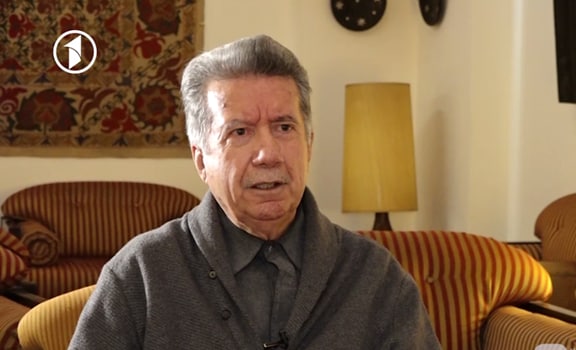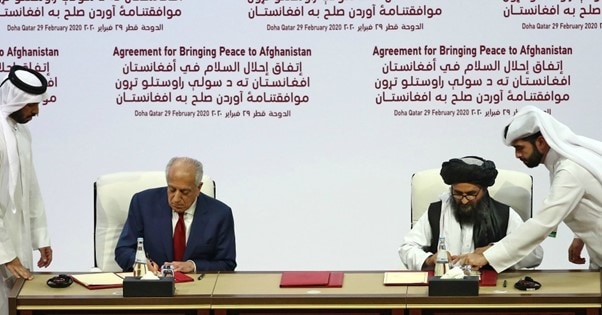In a recent article, respected former Pakistani senator Afrasiab Khattak criticized the United States for its coddling of the Islamic Emirate of Afghanistan (the Afghan Taliban organization) despite the Taliban's indiscriminate terror attacks against civilian targets such as girls' schools in Afghanistan.
In the article – titled "Talibanization In Afghanistan Could Explode Central Asia" and published by the Afghan news website ToloNews.com – Khattak noted that the U.S. has not changed its policy toward the Afghan Taliban even after Joe Biden took over as president in January 2021.[1] Khattak, a respected intellectual, added: "Some analysts go even further. They regard the emerging U.S.-Taliban nexus as the sign of a new Cold War in Eurasia."

Senator Afrasiab Khattak is known for his independent and forthright views (image: 1tvnews.af)
Known for his independent and forthright views on the regional security situation in South Asia, the former Pakistani senator also noted that the U.S.-Taliban deal signed on February 29, 2020, in Doha, Qatar, gave many concessions to the Afghan Taliban's jihadi organization, which still thrives on support from the Pakistani military and religious seminaries in Pakistan.[2]
Slamming the U.S. for excluding the democratically elected Afghan government from the U.S.-Taliban talks in Doha and ignoring its views totally in the Doha agreement, Khattak added: "Many of the Afghans have been critical of the U.S.-Taliban Doha peace deal signed in the absence of the Afghan state. They think too many concessions were given to the Taliban in the Doha deal without making them renounce violence/terrorism or critically evaluating their brutal past and their extremist ideological positions."
Following is the text of Afrasiab Khattak's article:
"The Taliban's Denial Of Their Involvement In Such [Terror] Attacks Isn't Convincing As Most Afghans Hold Them Responsible For The Ecology Of Violence And Terrorism In Afghanistan"
"The Islamic holy month of Ramadan [which in 2021 ended on May 13], in which Muslims observe daylong fasting, is supposed to be a time for strict piety, restraint, and self-discipline. But this year Ramadan saw unprecedented escalation in fighting and bloodshed in Afghanistan as the Taliban continued the ruthless carnage, targeting common Afghans in most parts of the war-ravaged country.
"The worst of the terrorist attacks in recent times came on May 8, when a car bomb targeted a girls' school in the suburbs of Kabul killing around eighty persons, most of them young girl students. The Taliban's denial of their involvement in such attacks isn't convincing as most Afghans hold them responsible for the ecology of violence and terrorism in Afghanistan, particularly as they refuse to go for even a reduction in violence, let alone accepting a permanent and full-fledged ceasefire even after signing a peace deal with the U.S. in Doha...
"Many of the Afghans have been critical of the U.S.-Taliban Doha peace deal signed in the absence of the Afghan state. They think too many concessions were given to the Taliban in the Doha deal without making them renounce violence/terrorism or critically evaluating their brutal past and their extremist ideological positions.
"Coined from the Arabic word 'Talib-ul-Ilm' (seeker of knowledge), the world Talib has, in the current political lexicon, come to stand for those young graduates of religious seminaries who fight to impose their own extremist interpretation of Islamic shari'a, replacing the modern state system in Pakistan and Afghanistan. The Islamic religious seminary is an old institution meant for teaching religion to Muslim children. But it underwent a sea change during the second half of the 20th century when the U.S.-led West decided to use political Islam in its war against its archrival, Soviet Communism."
"The Induction Of U.S. Armed Forces To Bring Down The Brutal Taliban Regime In Afghanistan [In 2001]... Created The Impression That The U.S. And The West Regard The Islamic Extremists/Militants As Their Enemies"
"It was particularly after the Soviet invasion of Afghanistan in the 1980s that the West and its Arab allies invested billions of dollars in promoting jihad (the holy war) against the 'infidels.' Thousands of religious seminaries were built in Pakistan that imported extremist ideologies from the Middle East in the garb of Islam to brainwash thousands of young Afghans to fight against the [so-called infidel] Soviet forces.
"In 1994 the Taliban as a distinct group of warriors emerged in Afghanistan to fill the vacuum created by the internecine wars of the former Afghan mujahideen [the predecessors to the Taliban]. Pakistan's security services adopted them as their ally to achieve the country's main goal of strategic depth in Afghanistan.
"Currently, there are around 36,000 religious seminaries in Pakistan functioning as factories to produce Taliban. It is a big and thriving industry, patronized by the [Pakistani] military, and run by the religious elites with huge investments from the Middle East. A good number of students here are still Afghans who have been used (and are still being used) as cannon fodder in different wars in Afghanistan during the last four decades.
"After the collapse of the Soviet Union in 1991, and particularly after the attacks by Al-Qaeda in the U.S. on 9/11, many people thought that the West would change its strategy of using political Islam against other competing world powers. The induction of U.S. armed forces to bring down the brutal Taliban regime in Afghanistan, and U.S. drone strikes against Al-Qaeda fighters in Pakistan, Afghanistan, the Middle East, and Africa, created the impression that the U.S. and the West regard the Islamic extremists/militants as their enemies and are fighting to eliminate this phenomenon."
"It Seems The U.S. Wants To Inject The Taliban Into The Afghan System Even At The Cost Of The Gains Of The Afghan State And Society During The Last Two Decades"
"But the recent developments – the U.S.-Taliban Doha deal in particular – denies this perception. Initially many people thought the Doha deal represented a political expedient of the [Donald] Trump administration in preparation for the presidential elections in 2020 in the U.S. But the way the new U.S. administration has refused to reconsider the Doha deal, despite its failure in bringing peace and reconciliation to Afghanistan, proves it to be the consistent U.S. policy toward [being lenient against] the Taliban.
"It seems the U.S. wants to inject the Taliban into the Afghan system even at the cost of the gains of the Afghan state and society during the last two decades, which includes the emergence of a Constitution-based state system, thriving urban centers, and a nascent but dynamic civil society (with an independent media in particular). Afghanistan has also been joining the regional and international mainstream.

U.S. envoy Zalmay Khalilzad signs Doha deal with Afghan Taliban in February 2020
"Apparently, the U.S. seems to be convinced that it has effectively degraded Al Qaeda's capacity to threaten the security of mainland U.S. and its European allies. As far as the terror syndicate connected with Taliban is concerned, it's a regional problem. Why should the U.S. worry about it? After all, it can be a headache for China, Russia, and Iran in Central and West Asia.
"Some analysts go even further. They regard the emerging U.S.-Taliban nexus as the sign of a new Cold War in Eurasia. The Belt and Road Initiative [BRI] of the emerging new economic superpower China is regarded by U.S. strategists to be the most significant challenge in the 21st century. They seem to be quite focused on making strategies to block this development. Post-Soviet Russia also seems to be reclaiming its traditional sphere of influence and expanding its footstep in the Middle East and elsewhere in the growingly multipolar world. Unfortunately, the geostrategic location of Afghanistan has the potential of attracting yet another big powers rivalry on its soil."
"Militant Organizations Like The Islamic Movement Of Uzbekistan (IMU) And Eastern Turkistan Islamic Movement (ETIM) Can Thrive On This New Political Wave [Of Turkish Islamism] Threatening Uzbekistan, Xinjiang, And Other Parts Of Central Asia"
"The emerging contours of the new Cold War reveal some similarities with the previous one as well as dissimilarities. The anti-China informal political and strategic alliance 'Quadrilateral Security Dialogue' or Quad [an emerging NATO-like alliance among U.S., India, Australia, Japan, etc.] is steadily becoming formalized and is expected to expand. Tensions in the South China Sea are not only expected to persist, but these can also intensify further. But like the previous Cold War, when tensions between NATO and the Warsaw Pact kept Europe polarized – and the actual physical clash took place during the Afghan war in 1980s – the new Cold War also has the potential of flaring up in Asia.
"Religious militancy/terrorism produced for and used in the previous clash also comes in handy for the new confrontation. It's particularly so when the jihad factories are still in production and hundreds of thousands of trained and war-hardened militants are still on the market. If the experience of the 1990s is anything to go by, the Taliban won't mellow with their contact with power. But even if they do, the other brands like ISIS [Islamic State], LeT [Lashkar-e-Taiba], JeM [Jaish-e-Muhammad] and TTP [Tehreek-e-Taliban Pakistan] are there to spread the anti-state militancy in the region. Daesh [ISIS], at least the one in eastern Afghanistan, is just the rebranding of the Taliban using the same basic ideological moorings, human material, and supply routes.
"Apart from religious extremism, ethnocultural nationalism is the other fault line that can also be used in the fresh political polarization. The fledgling Turkish nationalism, particularly in its Pan-Turkic form, seems to have greater potential in its political impact. It is especially so as Turkey, the bastion of modern Turkish nationalism, is detaching itself from its secular past and is embracing an Islamic Turkish identity.
"Turkey under [Tayyip] Erdogan may be doing it to expand its footprint in the Middle East but Turkish nationalism combined with Islamic fervor can be a lethal political tool in Central Asia also. Militant organizations like the Islamic Movement of Uzbekistan (IMU) and Eastern Turkistan Islamic Movement (ETIM) can thrive on this new political wave [of Turkish Islamism] threatening Uzbekistan, Xinjiang, and other parts of Central Asia. Despite local political problems in the Central Asian republics, the countries have been able to avoid prolonged internal armed conflicts so far because of the lack of a large scale international intervention. But a Talibanized Afghanistan can fundamentally change the situation."
[1] ToloNews.com (Afghanistan), June 4, 2021. The original English of the article has been lightly edited for clarity and standardization.
[2] For further reading on the U.S.-Taliban agreement signed in Doha, read: MEMRI Daily Brief No. 272, The Afghan Taliban's Goal Is To Establish A Sunni Islamic Theocratic State – They Do Not Believe In Power-Sharing With A Democratically Elected Government, April 22, 2021; MEMRI Daily Brief No. 261, Afghan Taliban's Operational Chief Sirajuddin Haqqani Warns The Biden Administration Against Scrapping The Doha Agreement: 'We Have The Technology To Use Drones, We Have Our Own Missiles; This Time If The Mujahideen Resume Fighting, It Would Be Something [The Americans] Have Never Seen Before', March 3, 2021; MEMRI Daily Brief No. 215, Handing Afghanistan Over To The Taliban – The Menacing Brinkmanship In Kabul As Ashraf Ghani Government Is Badgered By Both The U.S. And The Taliban, April 21, 2020.




